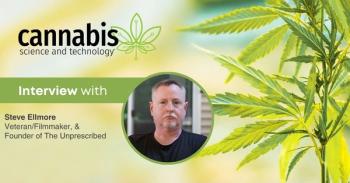
Cannabis Science Conference Fall LIVE Coverage: Dr. Ryan Buck and Rebecca Abraham Discuss the Role of Cannabinoids in the Treatment of Dementia and Alzheimer's Disease
Dr. Buck co-presented at the Cannabis Science Conference on September 22, 2023, with his talk titled “Cannabinoids for the Treatment of Agitation in Dementia,” with Rebecca Abraham, RN, BSN, the CEO and Founder of Acute on Chronic.
On Day 2 of the Cannabis Science Conference, Ryan Buck, an internal medicine physician, medical director, and research director, and Rebecca Abraham, the CEO and founder of Acute on Chronic, the first cannabis nurse clinic in the Midwest, presented their experiences with treating the symptoms of dementia and Alzheimer’s disease (AD) with various cannabinoids. Their presentation was titled, “Cannabinoids for the Treatment of Agitation in Dementia”, was well-received by attendees.
Dr. Buck began speaking on the symptoms stemming from dementia and Alzheimer’s disease, as well as a brief description on the endocannabinoid system (ECS). As Dr. Buck continued on, he emphasized how beneficial the use of cannabis can be for the elderly community who suffer from these neurodegenerative diseases and began discussing AD cannabinoid research that was tested on mice.
“I think there's a variety of studies you know many different mechanisms here that we think that it can be this multimodal approach. Where it helps as there's been plenty of evidence looking again in the lab that activation of CB1 and CB2 receptors specifically for Alzheimer's disease (AD) will reduce the buildup of these beta amyloid plaques and Tau proteins. These are the plaques that develop in the brain of Alzheimer's disease, that lead to disruption in the neuronal signaling to lead to cell death of those neurons in the brain and we know that activation of these receptors using cannabinoids reduce the burden of those plaques. It promotes the brains intrinsic repair mechanisms and it kind of down regulates some of the neuron excitotoxicity that comes along with anxiety. It reduces neuroinflammation that comes with these proteins that leads to the cell death, it also produces oxidative stress and all things that are leading to cognitive impairments.”
Continuing on this topic, Dr. Buck disclosed that the study utilized high dosages of tetrahydrocannabinol (THC) in mice which showed that older mice seemed to receive a boost in cognition.
“Another study that is looking at higher doses of THC, lead to protein buildup of these plaques in the brain and lead to longer cell survival,” Dr. Buck said. He mentioned how a variety of cannabinoids can be used to help cells live longer which could help prolong the cognitive abilities of the patient and provide a better quality of life as it would slow down the advancement of the disease. Rebecca Abraham added later on in the presentation of how cannabinoids such as cannabigerol (CBG) can help lower inflammation in the brain and is believed to “strengthen the function of anandamide” which enhances pleasure, motivation, regulation of appetite and sleep, as well as alleviates pain.
Rebecca and Dr. Buck ended their presentation with discussing some of the various methods of cannabis consumption and what they have found to be the best approaches in supplying cannabis to the elderly such as how edibles and transdermals were the easiest ways of consumption. Edibles are not only good tasting, so they are easy for seniors to consume but they also have long-lasting effects. Transdermals were also a good option due to the product not having to be consumed orally, all that it requires is placing it on the skin and if there are any negative side effects, it can be removed by the caregiver to relieve them.
In the future, Dr. Buck and Rebecca hope to add on to their work and study more research such as the work being done by Dr. Blake Pearson and Dr. Mikelle Bryson-Campbell, who presented their talk on Day 1 of the Cannabis Science Conference titled, “Exploring Cannabinoid Therapy as a Safer Alternative for Dementia Symptom Management”.
Newsletter
Unlock the latest breakthroughs in cannabis science—subscribe now to get expert insights, research, and industry updates delivered to your inbox.



